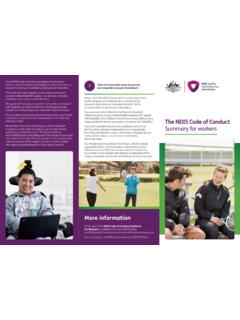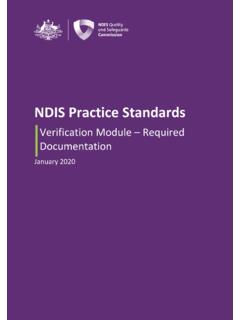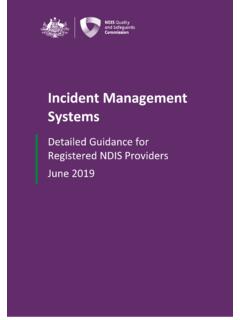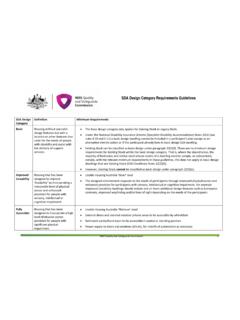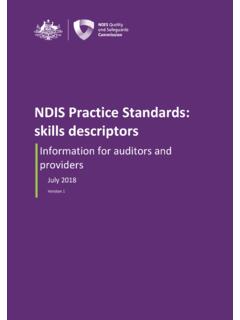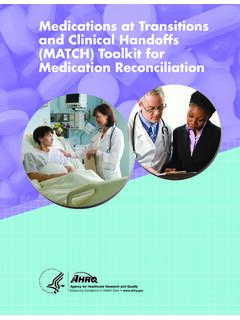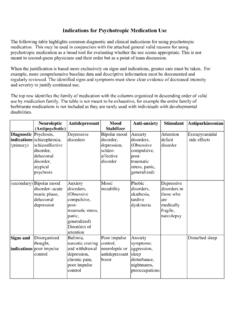Transcription of Practice Alert: Transitions of care between disability ...
1 Practice Alert Transitions of care between disability services and hospitals November 2020. Key points Transitions of care refers to the movement of people between places or services providing care such as people moving between disability support services and hospitals. Transitions of care are key points where there is risk of harm to participants. In Australia, problems in transition of care have been associated with risks of harm to people who have a disability . Safe transition of care requires clear communication about, and coordination of, participant care between providers, health care staff, participants and their support network. Background People with disability have the right to the highest possible standard of health. This includes equitable access to health services that address their individual health needs, as well as access to appropriate supports before, during and after hospital admissions.
2 Services involved in supporting the health of Australian people with disability are guided by Practice standards of safe, high quality health care and disability support. Australian people with disability commonly access hospital services, with 22% being admitted to hospital and 26% having visited a hospital emergency department in 2015. Australian reports on the deaths of people with disability outline serious and life-threatening risks if Transitions of care are mismanaged. Areas of concern include the management of medications, and lack of necessary follow up care after hospital discharge. Practice Alert: Transitions of care between disability services and hospitals Page 1. Transitions of care are priority areas for improving medication safety and reducing avoidable harms.
3 during Transitions to and from different healthcare settings, a lack of clear communication about a person's healthcare needs and current treatments can increase the risk of harms. Safe Transitions of care require clear communication and co-ordination between the person with disability , their carers, health care and disability support services. Communication and co-ordination between services and the person's support network helps ensure that critical information about the person's health needs, potential risks and current health care are not lost during Transitions of care. Transitions of care covered in this alert include: going to hospital from home or supported accommodation leaving hospital to return home or to supported accommodation How to support NDIS participants during Transitions of care to and from hospitals Prepare for possible Transitions of care by: keeping the participant's health and medication information accurate and up-to-date communicating with other services during Transitions of care helping participants understand and communicate information about their health.
4 Prepare for a planned hospital admission Consider supporting participants to prepare for planned hospital admissions by arranging a pre-admission meeting with hospital staff to: co-ordinate the transition of care with the participant, relevant hospital staff, disability support staff and if possible, the participant's support people such as family or friends. inform hospital staff about the participant's communication requirements, mobility and physical support needs, nutrition and mealtime management, and behaviour support strategies. Information to provide to hospital staff If you are responsible for a participant's medical records and care, or have consent from participants, guardians or carers to share information, make the following available to hospital staff on admission: My Health Record (if used by the participant).
5 Hospital Support Plan based on the participant's specific needs and requirements List of current medications Webster packs and other required medications Health Care Card Medicare Card Behaviour Support Plan Communication plan/profiles and any related communication aids/tools. Practice Alert: Transitions of care between disability services and hospitals Page 2. Provide support during emergency admission to hospital For an emergency visit to hospital, you may need to arrange for a disability support worker familiar to the participant to stay with them during the admission. Support when the participant leaves the hospital Plan for discharge from the hospital Plan for the participant's hospital discharge in consultation with health professionals as early as possible, including: estimated date of transfer destination of transfer transportation referral services home assessments for equipment, modifications re-assessing support risks, ( wound management, tube feeding).
6 Understand the participant's ongoing support needs and assess your capacity to meet them Work with hospital staff to understand the participant's ongoing needs after they leave hospital. This includes obtaining the following: Transfer of Care summary: summary of the medical care the person received in hospital. Care plan: follow-up appointments with medical specialists, care recommendations for the person's regular health care providers such as their GP, and any other required health or social requirements. Medications summary: list of current medications, including information about any new or changed medications. Ask about and understand any changes to the person's ongoing care needs that have occurred during their hospital stay, and assess whether you can provide for these (for example, if the participant now requires specifically trained staff or equipment).
7 If you cannot provide these new care requirements, you must clearly communicate this to hospital staff as soon as possible. Early and ongoing communication with hospital staff, the participant, support people such as carers (and, if required the participant's NDIS plan manager), can prevent delays in leaving hospital and reduce risk to participants following discharge. Give the participant information about their follow-up care when they leave hospital. If required, make this available in Easy English if required. Practice Alert: Transitions of care between disability services and hospitals Page 3. Recommended ways to support NDIS participants admitted to hospital Prepare for potential hospital admissions by keeping participants' health-related information and documentation up-to-date and accurate, so it can be readily communicated to hospital staff.
8 Support participants to prepare for a hospital admission by coordinating a pre-admission meeting with hospital staff and the participant's support network. Plan Transitions out of hospital as early as possible based on professional medical advice to ensure that any changes in care are considered. Work with hospital staff and the participant's support network to ensure you can provide any additional health-related support the participant may require after they leave hospital. Provider obligations related to Transitions of care NDIS Code of Conduct The NDIS Code of Conduct requires all NDIS providers and workers who deliver NDIS supports to NDIS participants to, among other things: provide supports and services in a safe and competent manner with care and skill promptly take steps to raise and act on concerns about matters that might have an impact on the quality and safety of supports provided to people with disability .
9 NDIS Practice Standards As a registered NDIS provider, you also have obligations under the NDIS Practice Standards, as part of your conditions of registration, that relate to the delivery of safe, quality supports and services, and the management of risks associated with the supports you provide to NDIS participants. The NDIS Commission's guidance on the NDIS Practice Standards and Quality Indicators provides a further resource to assist registered NDIS providers understand their obligations. The NDIS Practice Standards that are relevant to this alert include: Risk management: Risks to participants are identified and managed. Quality management: Each participant benefits from a quality management system relevant and proportionate to the size and scale of the provider, which promotes continuous improvement of support delivery.
10 Information management: Management of each participant's information ensures it is identifiable, accurately recorded, current and confidential. Each participant's information is easily accessible to the participant and appropriately utilised by relevant workers. Incident management: Each participant is safeguarded by the provider's incident management system, ensuring that incidents are acknowledged, respond to, well-managed and learned from. Practice Alert: Transitions of care between disability services and hospitals Page 4. Management of medication : Each participant requiring medication is confident their provider administers, stores and monitors the effects of their medication , and works to prevent errors or incidents. References Australian Commission on safety and Quality in Health Care (2020).
